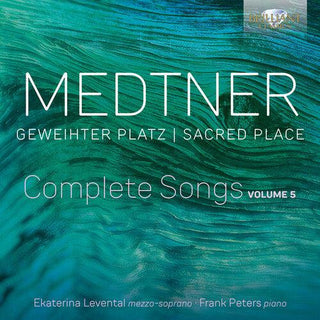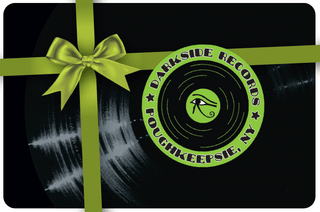Medtner- Medtner: Geweihter Platz (Sacred Place), Complete Songs, Vol. 5

An unprecedented and critically praised series reaches it's fifth and final volume with richly evocative settings of German and Russian poets, from Pushkin to Nietzsche and beyond. Though born in Moscow, Medtner had partially German ancestry, and nearly half his songs are set to German poetry, which he knew in the original. In previous volumes of their complete survey of his songs, Ekaterina Levental and Frank Peters have concentrated on the Russians; now they conquer the peaks, as Medtner did, of Romantic German poetry, with texts by Goethe, Chamisso and Eichendorff. Rather less well known as a poet was Friedrich Nietzche, but he was a figure who fascinated Medtner, and the settings here speak of deep affinity. In the booklet, Ekaterina Levental reflects on her own sense of affinity with the composer. 'It was love at first hearing. It was as if someone whispered to me a truth for which there were no sounds before. He sounded out for me emotions and feelings, images, associations, a world of felt knowledge and experiences that I had been carrying inside me all along, but had never heard expressed in such a way. Someone from the past spoke to me in a language that I seemed to understand totally instinctively. Passing on this knowledge and wonder and sharing it with the audience became my dream.' This cycle on record has been a passion project for both artists, and Peters also passes on his own insights into Medtner's notoriously complex piano writing. Between them, they have gone further than anyone else in documenting a perennially undervalued Russian song composer, who deserves to be considered alongside Rachmaninoff and Tchaikovsky in this vein. This final volume closes out the cycle with the Eight Lieder Op.61, which move between Russian and German poets in a quintessentially Medtnerian synthesis. 'All in all, Levental and Peters make the strongest possible case for the repertoire... Levental continues to strike us with the beauty and purity of her voice and the rhetorical sensitivity of her phrasing, unfailingly tied to the affect of the text.' (Fanfare)
An unprecedented and critically praised series reaches it's fifth and final volume with richly evocative settings of German and Russian poets, from Pushkin to Nietzsche and beyond. Though born in Moscow, Medtner had partially German ancestry, and nearly half his songs are set to German poetry, which he knew in the original. In previous volumes of their complete survey of his songs, Ekaterina Levental and Frank Peters have concentrated on the Russians; now they conquer the peaks, as Medtner did, of Romantic German poetry, with texts by Goethe, Chamisso and Eichendorff. Rather less well known as a poet was Friedrich Nietzche, but he was a figure who fascinated Medtner, and the settings here speak of deep affinity. In the booklet, Ekaterina Levental reflects on her own sense of affinity with the composer. 'It was love at first hearing. It was as if someone whispered to me a truth for which there were no sounds before. He sounded out for me emotions and feelings, images, associations, a world of felt knowledge and experiences that I had been carrying inside me all along, but had never heard expressed in such a way. Someone from the past spoke to me in a language that I seemed to understand totally instinctively. Passing on this knowledge and wonder and sharing it with the audience became my dream.' This cycle on record has been a passion project for both artists, and Peters also passes on his own insights into Medtner's notoriously complex piano writing. Between them, they have gone further than anyone else in documenting a perennially undervalued Russian song composer, who deserves to be considered alongside Rachmaninoff and Tchaikovsky in this vein. This final volume closes out the cycle with the Eight Lieder Op.61, which move between Russian and German poets in a quintessentially Medtnerian synthesis. 'All in all, Levental and Peters make the strongest possible case for the repertoire... Levental continues to strike us with the beauty and purity of her voice and the rhetorical sensitivity of her phrasing, unfailingly tied to the affect of the text.' (Fanfare)





